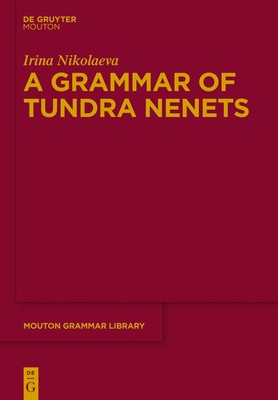
- We will send in 10–14 business days.
- Author: Irina Nikolaeva
- Publisher: Walter de Gruyter
- Year: 2014
- Pages: 511
- ISBN-10: 3110320479
- ISBN-13: 9783110320473
- Format: 17 x 24.4 x 2.9 cm, hardcover
- Language: English
- SAVE -10% with code: EXTRA
Reviews
Description
The book is the first substantial description of Tundra Nenets, a highly endangered Uralic language spoken in Western Siberia and the north of European Russia, destined for the international linguistic community. Its purpose is to provide a thorough documentation of all of the major grammatical phenomena in the language. The grammar particularly emphasizes the description of syntax, because this has traditionally been a very neglected area of Nenets studies. Many syntactic aspects have not received a systematic treatment in the existing literature or have not been addressed at all. Since the existing works are not easily available, incomplete, or idiosyncratically presented, Tundra Nenets syntax has played little or no role in the considerations of modern linguists, whether more descriptively or theoretically inclined. The book is largely descriptive: it is not intended to address theoretical questions per se and the description is not meant to be formulated within a particular framework. However, it identifies and discusses issues which are of broad typological and theoretical interest. The description is richly exemplified. Most of the cited examples are the result of fieldwork conducted by the in various locations. They are sentences produced by native speakers either spontaneously or elicited in response to questions posed in Russian. Other examples are excerpts from original texts.
EXTRA 10 % discount with code: EXTRA
The promotion ends in 20d.09:29:37
The discount code is valid when purchasing from 10 €. Discounts do not stack.
- Author: Irina Nikolaeva
- Publisher: Walter de Gruyter
- Year: 2014
- Pages: 511
- ISBN-10: 3110320479
- ISBN-13: 9783110320473
- Format: 17 x 24.4 x 2.9 cm, hardcover
- Language: English English
The book is the first substantial description of Tundra Nenets, a highly endangered Uralic language spoken in Western Siberia and the north of European Russia, destined for the international linguistic community. Its purpose is to provide a thorough documentation of all of the major grammatical phenomena in the language. The grammar particularly emphasizes the description of syntax, because this has traditionally been a very neglected area of Nenets studies. Many syntactic aspects have not received a systematic treatment in the existing literature or have not been addressed at all. Since the existing works are not easily available, incomplete, or idiosyncratically presented, Tundra Nenets syntax has played little or no role in the considerations of modern linguists, whether more descriptively or theoretically inclined. The book is largely descriptive: it is not intended to address theoretical questions per se and the description is not meant to be formulated within a particular framework. However, it identifies and discusses issues which are of broad typological and theoretical interest. The description is richly exemplified. Most of the cited examples are the result of fieldwork conducted by the in various locations. They are sentences produced by native speakers either spontaneously or elicited in response to questions posed in Russian. Other examples are excerpts from original texts.


Reviews